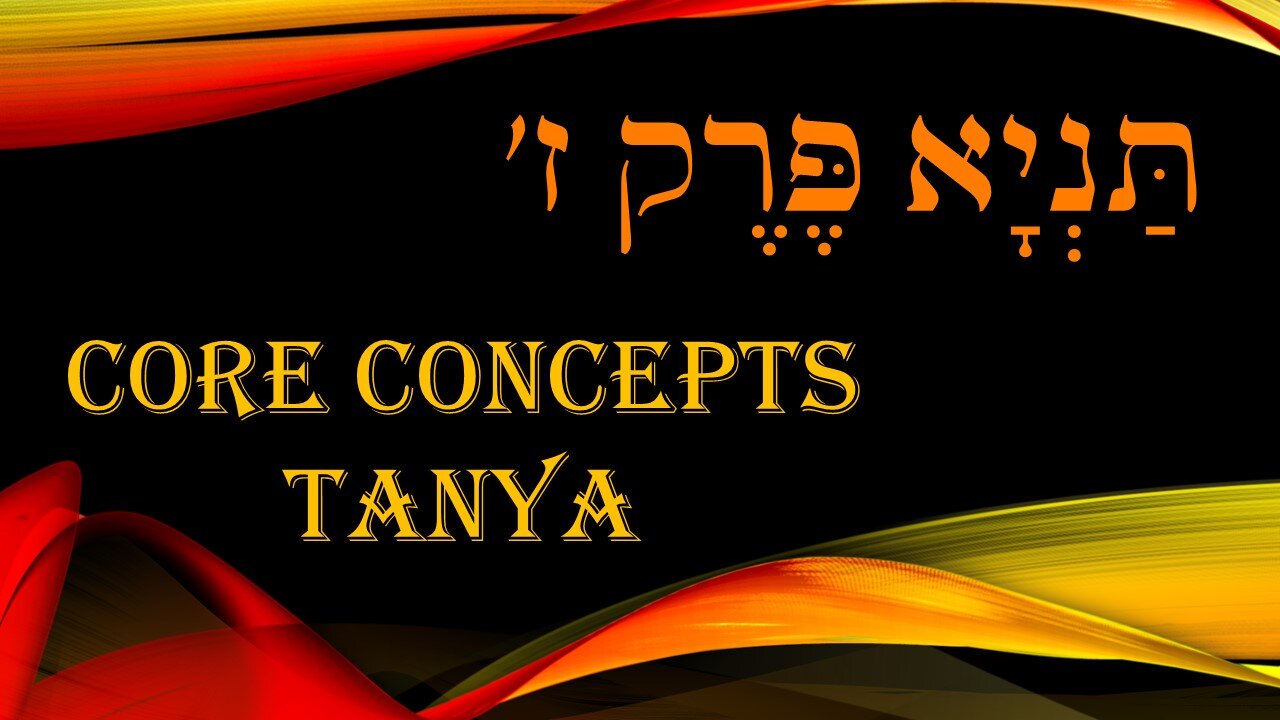Premium Only Content

Core Concepts Tanya: Chapter 7
Brief Recap of Chapter 7:
1. Chapter 7 picks up where Chapter 6 left off in discussing the two levels of "Klipah."
Klipas Nogah includes all things that are permissible, mundane actions that have the potential for holiness.
Shalosh Klipos Hatme'os, the Three Impure Klipos, includes anything forbidden and contains no element of good whatsoever. These are not only evil, but also anything which is forbidden, for the simple reason that Hashem says this is not how we bring holiness into the world.
2. The world we live in is called the World of Asiyah, the world of action.
From all the worlds, this is the only physical world, the world in which Torah can be kept and Mitzvot can be performed.
However, in this world, the negative elements, even evil elements, often overshadow the good, or the potential for good in this world.
It is our mission to extract that good and elevate it to holiness.
3. In regard to mundane acts that can be elevated, we use two main examples.
One is eating. The actual act of eating is neutral, but it can become good or bad depending on our intentions when eating.
If we eat to keep our bodies healthy, to nourish ourselves so that we can fulfill our purpose in this world, so that we can be at our best, then this act of eating is elevated.
If we eat simply to indulge ourselves, if we give in to gluttony, then we degrade the act of eating. It's the difference between eating to live and living to eat.
The second example is in making a joke.
Do we make jokes just to waste time, mock, and give in to frivolity, or do we joke to relax and open our minds to learning new things?
The two examples highlight our goal to even subconsciously train ourselves to dedicate our actions to G-d.
When we think that our actions are all for a higher purpose, be it going to work, exercising, painting, whatever, we elevate even the simplest of actions.
4. The world for forbidden things is "Assur." The word for permitted things is "Mutar."
Assur doesn't mean forbidden, but bound, because the energy within a forbidden act is bound and trapped by the "Sitra Achra," the "Other Side."
Mutar means unbound, because when we use a mundane object for something good, we untie and elevate the Divine energy in that object.
5. The word "Teshuvah," what we usually translate to mean repentance, comes from the word of return, as in bringing ourselves closer to our Heavenly source.
6. This chapter ended with discussing the power of saying the nighttime Shema, likening it to a double-edged sword against the forces of the "Other Side." It also spoke about the holiness, and greatest, Divine gift we have in our ability to create life, and what it means to belittle that opportunity.
-

Badlands Media
10 hours agoBadlands Media Fantasy Football Live Draft
16K -
 2:12:29
2:12:29
Inverted World Live
4 hours agoWe Are Time Travelers | Ep. 100
65.6K8 -
 2:57:09
2:57:09
TimcastIRL
4 hours agoCorporate Press Refuses To Mention Minneapolis Shooter Was Trans | Timcast IRL
170K85 -
 LIVE
LIVE
Akademiks
4 hours agoWar in RAT-LANTA. Young Thug vs Gunna vs Ralo vs YSL MONDO. Who Will Le Bebe Pick. FINAL CRASHOUT!
1,798 watching -
 1:02:24
1:02:24
Man in America
7 hours agoThe Final Battle: Nanotech, Transhumanism & the War for Your Soul w/ Dr. Ed Group
29.5K2 -
 39:56
39:56
Sarah Westall
2 hours agoUpcoming World Wide Economic Collapse/Deep Recession & What the Big Money is Doing w/ Ed Dowd
21.6K3 -

Barry Cunningham
3 hours agoIT'S MOVIE NIGHT WITH BARRY!
34.5K22 -
 31:05
31:05
The Why Files
2 days agoPeru's Most Terrifying Mystery | The Face Peelers
40.3K41 -
 1:32
1:32
Gaming on Rumble
11 hours agoWhat is the Rumble Creator Program?!?! | Lvl UP
29.1K4 -
 1:50:49
1:50:49
Flyover Conservatives
23 hours ago9/11 on Steroids: What’s Coming This Fall? - Bo Polny | FOC Show
40.6K7